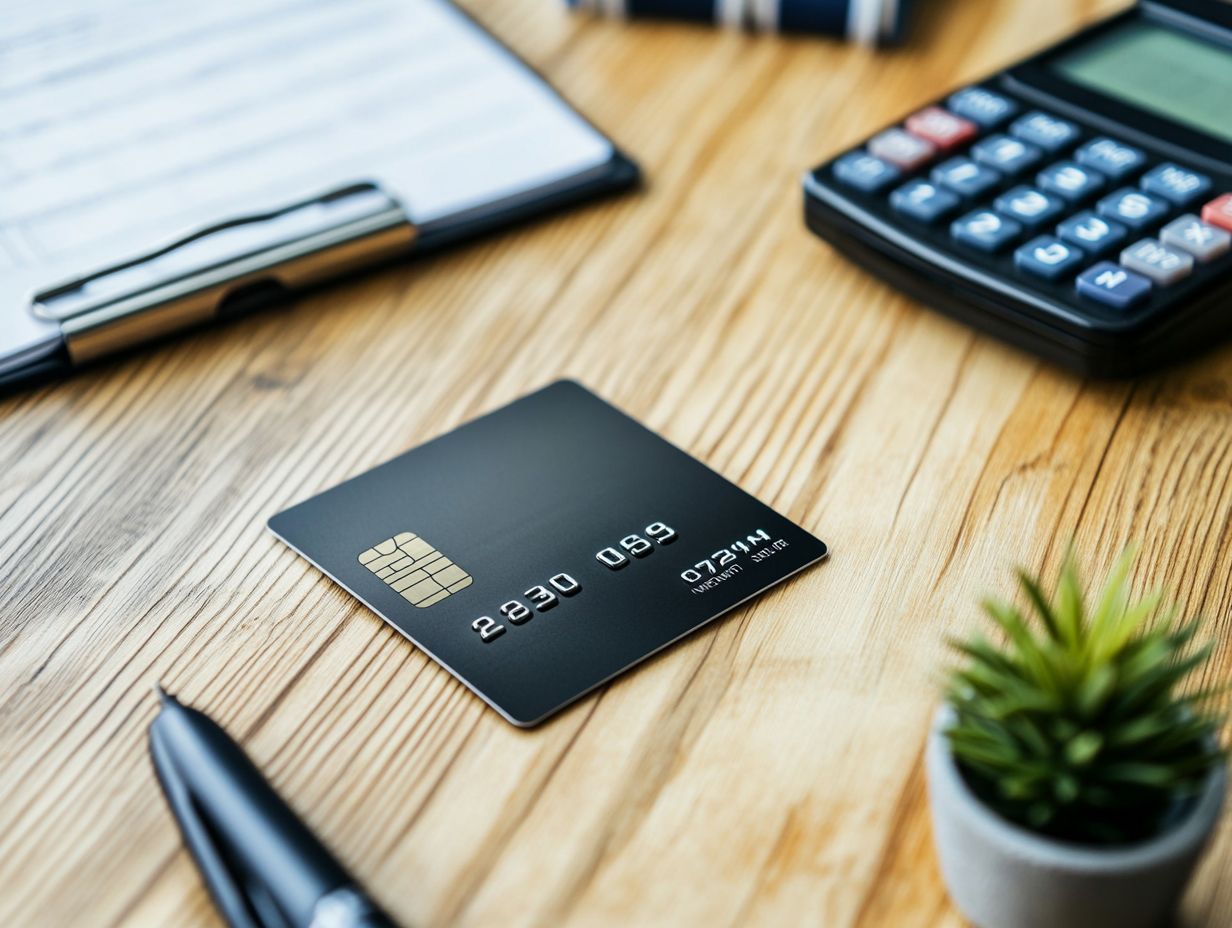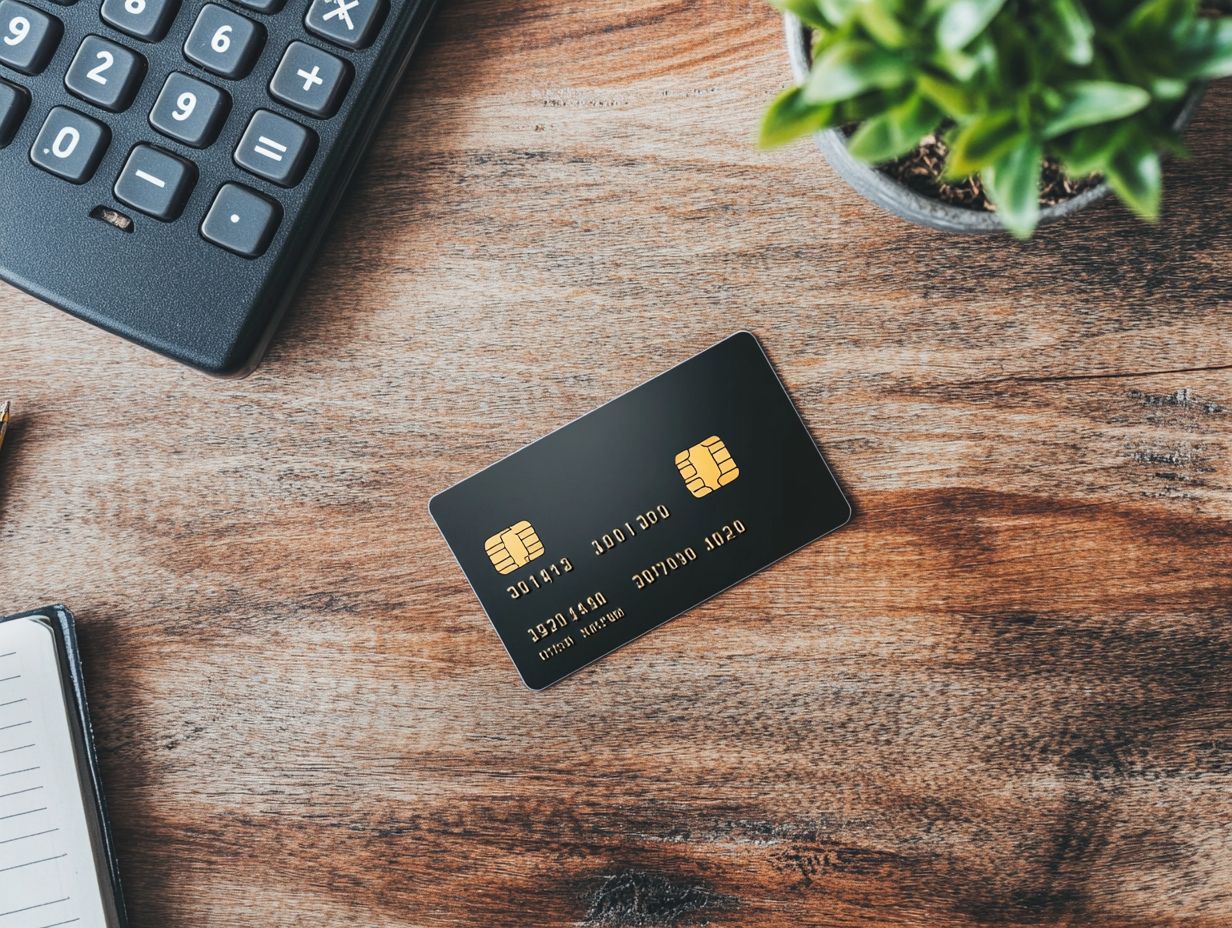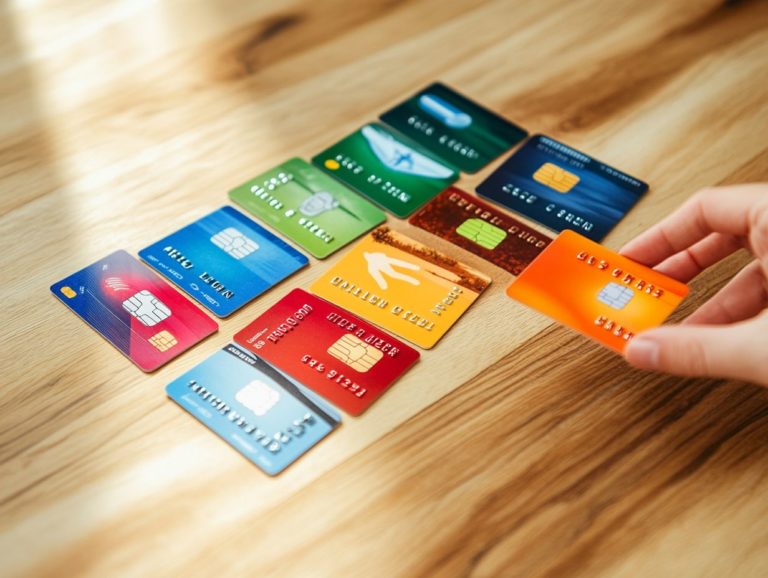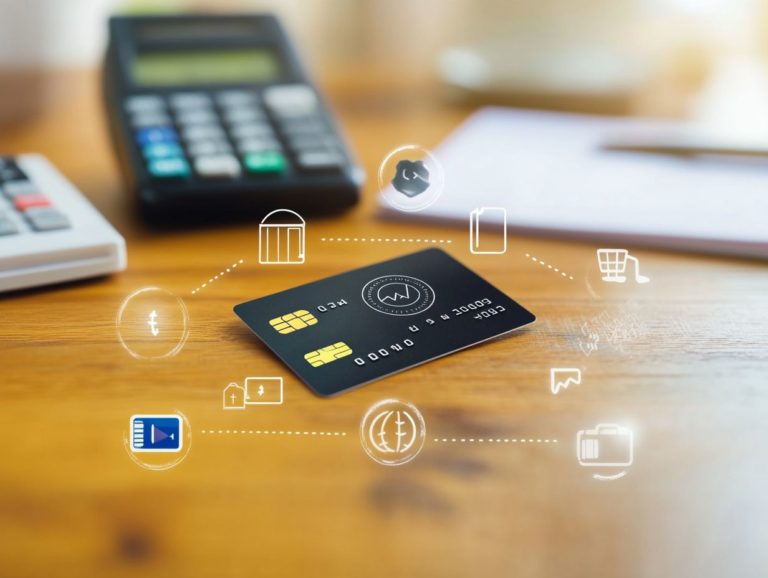The Advantages of Secured Credit Cards
Secured credit cards are great tools for building or rebuilding your credit history. Unlike traditional credit cards, secured cards require a cash deposit as collateral, making them a lower-risk option for lenders.
This guide explains how secured credit cards work. It highlights their benefits and offers tips for choosing the best one for your finances.
Whether you re new to credit or trying to improve your score, understanding these cards can unlock a world of exciting opportunities.
Contents
- Key Takeaways:
- Understanding Secured Credit Cards
- How Secured Credit Cards Work
- The Benefits of Secured Credit Cards
- How to Choose the Right Secured Credit Card
- Frequently Asked Questions
- What are secured credit cards and what are their advantages?
- How do secured credit cards help individuals build or rebuild their credit?
- What are the potential savings with secured credit cards due to lower interest rates?
- Can secured credit cards be used to make purchases and payments like traditional credit cards?
- Is there a possibility to upgrade a secured credit card to an unsecured credit card?
- Are there any downsides to using a secured credit card?
Key Takeaways:

- Secured credit cards provide a way to establish or rebuild credit history, making them valuable tools for those with no or poor credit.
- By requiring collateral, secured credit cards offer lower risk for lenders, allowing them to extend credit to individuals who may not qualify for unsecured cards.
- Choosing the right secured credit card involves considering interest rates, fees, and the potential for credit limit increases, in addition to comparing them with unsecured options.
Understanding Secured Credit Cards
Grasping the nuances of secured credit cards is crucial for anyone looking to enhance their financial well-being and build a strong credit history. These cards cater to individuals with limited or less-than-stellar credit scores, helping you develop responsible financial habits through regular use.
By requiring a cash deposit as collateral, secured credit cards significantly reduce the credit risk for issuers, making it easier for you to access credit. Over time, this can greatly improve your ability to get credit.
Definition and Purpose
A secured credit card is a unique financial tool that requires a cash deposit to establish your credit limit, serving as collateral for your line of credit.
This card can be your ticket to better credit if you’re looking to build or rebuild your credit history. It offers a manageable way to demonstrate your creditworthiness. By using the secured card responsibly making timely payments and keeping your balances low you can gradually enhance your credit score.
Good financial habits make it easier to qualify for traditional credit products. Ultimately, a secured card can serve as a stepping stone, opening the door to better financial opportunities and greater spending power.
How Secured Credit Cards Work
Secured credit cards work by requiring you to provide a cash deposit as collateral. This not only establishes your credit limit but also protects the credit card issuer.
This arrangement effectively reduces credit risk for lenders, allowing you to build or rebuild your credit profile with greater ease and confidence.
Collateral and Credit Limits
Collateral in the form of a cash deposit is vital for determining the credit limit for your secured credit card. This deposit serves as a safety net for the lender and establishes the maximum credit available to you.
Essentially, the larger your cash deposit, the higher your credit limit tends to be, reflecting the issuer’s trust in your ability to manage funds wisely.
For you, this type of card functions as both a financial instrument and a stepping stone for building your credit history. By consistently making timely payments and adopting responsible spending habits, you can gradually enhance your credit score, making it easier to access better credit terms in the future.
Don t wait! Start building your credit today with a secured credit card.
Interest Rates and Fees

Interest rates and fees for secured credit cards can vary a lot. This directly affects how much credit will cost you.
Understanding these differences is crucial when considering this financial product. Common fees include annual fees, which can range from low to high amounts based on the card issuer.
Interest rates depend on your credit score and may change over time. It’s essential to understand how these rates can impact your repayment obligations.
By familiarizing yourself with these costs, you can cultivate responsible financial habits, ensuring that you choose a secured credit card that aligns with your budget and long-term financial goals.
The Benefits of Secured Credit Cards
The advantages of secured credit cards go well beyond mere access to credit. They offer you a clear way to build your credit history, cultivate responsible financial habits, and ultimately position you to qualify for higher credit limits over time. To fully understand these benefits, check out the benefits of using a secured credit card.
Building Credit History
Using a secured credit card can significantly boost your credit score. By making on-time payments and keeping your balance low, you improve your credit profile over time.
Regularly monitoring your credit reports is essential for tracking your progress and ensuring accuracy. Spotting any errors or discrepancies early can help you maintain a healthy credit score.
Ultimately, a secured credit card serves as a stepping stone to financial credibility and highlights the benefits of using credit cards responsibly, underscoring the importance of cultivating responsible financial habits.
Less Risk for Lenders
Secured credit cards are safer for lenders because they require a cash deposit. This deposit acts as a safety net, making it easier for those with previous financial challenges to get approved.
This built-in reduction in credit risk gives power to issuers, allowing them to offer credit options to individuals who might struggle to qualify for traditional credit products. By requiring a deposit that matches the credit limit, lenders can confidently approve applications they might otherwise decline.
This approach not only paves the way for you to rebuild your credit score but also contributes to a more inclusive financial landscape.
For lenders, it translates into a reliable revenue stream with reduced chances of default, while you gain the invaluable opportunity to establish a solid credit history and enhance your financial standing.
Opportunities for Credit Limit Increases
Secured credit cards can help you increase your credit limit when used responsibly. If you consistently make payments on time, many issuers will review your account for eligibility.
If you receive approval for an increase, not only does this enhance your purchasing power, but it also highlights your creditworthiness. This sets the stage for a seamless transition to unsecured credit cards in the future.
As you continue to build your credit score through responsible financial behaviors, you may discover that you qualify for even more attractive terms and higher limits, further supporting your financial growth.
How to Choose the Right Secured Credit Card

Choosing the right secured credit card means looking at interest rates and fees. Think about how easy it is to switch to an unsecured card later.
Each of these elements plays a vital role in shaping your financial journey.
Factors to Consider
When you’re considering a secured credit card, there are several key factors to take into account: interest rates, annual fees, and the required cash deposit.
These elements significantly shape your experience as a cardholder and your overall financial health. For example, higher interest rates can lead to considerable costs if you don’t pay off your balance in full each month. This could undermine your goal of building credit.
Annual fees can vary widely among different cards and might erode any benefits you hope to gain from responsible usage. The cash deposit you provide, which typically serves as collateral an amount of money that you set aside to secure your credit can impact your cash flow since it’s capital that s tied up and not easily accessible.
Compare different secured cards. This helps you make an informed choice that fits your budget and financial goals.
Comparison with Unsecured Credit Cards
Comparing secured credit cards to unsecured ones is crucial for grasping the differences in risk, requirements, and potential benefits.
Secured credit cards require a cash deposit. This deposit acts as a safety net for the lender. In contrast, unsecured cards don t have this requirement, but they may come with higher interest rates and fees. That security deposit can also mean financial liabilities for you, as missing payments could lead to steeper fees.
Both card types will affect your credit score through payment history, a key element in credit scoring. If you use a secured card responsibly, it can be a powerful tool to boost your credit score over time. On the flip side, relying solely on unsecured cards can lead to riskier financial behavior if not managed carefully.
Frequently Asked Questions
What are secured credit cards and what are their advantages?
A secured credit card is a type of credit card that requires a security deposit as collateral for the credit limit. This means that the credit limit is typically equal to the amount of the security deposit. The advantages of secured credit cards include helping individuals build or rebuild their credit, lower interest rates, and the potential to upgrade to an unsecured credit card in the future.
How do secured credit cards help individuals build or rebuild their credit?

Secured credit cards are a great option for individuals with no credit history or a low credit score. By making timely payments and keeping the credit utilization low, individuals can demonstrate responsible credit behavior, which can help improve their credit score over time.
What are the potential savings with secured credit cards due to lower interest rates?
Secured credit cards typically offer lower interest rates compared to other credit cards. This makes them a more affordable option for individuals who may carry a balance. Additionally, the advantages of using business credit cards can also lead to potential savings on interest payments, allowing individuals to pay off their balance faster.
Can secured credit cards be used to make purchases and payments like traditional credit cards?
Yes, secured credit cards can be used just like traditional credit cards for making purchases and payments. As long as the minimum payment is made on time each month, individuals can continue to use the card and build credit while also avoiding interest charges.
Is there a possibility to upgrade a secured credit card to an unsecured credit card?
Yes, many secured credit card issuers offer the opportunity to upgrade to an unsecured credit card after a certain period of responsible credit card use. You might get a higher credit limit and lower interest rates. Plus, you can get your security deposit back!
Are there any downsides to using a secured credit card?
One potential downside of using a secured credit card is the initial security deposit required, which can be a lot of money for some people. Additionally, some secured credit cards may have higher fees and interest rates compared to traditional credit cards. It’s important to carefully research and compare options before choosing a secured credit card.






